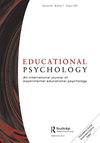Influence of teacher innovative behaviour on students’ academic self-efficacy and intrinsic goal orientation
IF 3
2区 心理学
Q1 EDUCATION & EDUCATIONAL RESEARCH
引用次数: 0
Abstract
Abstract Non-cognitive outcomes like Academic Self-efficacy (ASE) and Intrinsic Goal Orientation (IGO) have a bearing on students’ academic and life outcomes. Yet, the way teacher practices influence these outcomes has remained underexplored. We examined the influence of Teacher Innovative Behaviour (TIB) on students’ IGO and ASE within a span of one academic year (2015–16) in Indian government primary schools. Using structural equation modelling, we studied change in IGO and ASE among school students (N = 6421, grades 6–8) taught by 346 teachers with varying levels of TIB. The findings revealed that higher levels of TIB predicted higher levels of IGO but were unrelated to ASE after controlling for student demographics and prior outcomes. The independent variables collectively explained 20% and 15% of the variation in IGO and ASE. The implications of this study for teacher educators, education administrators, and policymakers are discussed.教师创新行为对学生学业自我效能感和内在目标取向的影响
学习自我效能感(ASE)和内在目标取向(IGO)等非认知结果影响着学生的学业和生活结果。然而,教师实践影响这些结果的方式仍未得到充分探索。我们在印度公立小学的一个学年(2015-16)内研究了教师创新行为(TIB)对学生IGO和ASE的影响。利用结构方程模型,我们研究了346名不同程度TIB教师所教的6-8年级学生(N = 6421)的IGO和ASE的变化。研究结果显示,较高的TIB水平预示着较高的IGO水平,但在控制学生人口统计学和先前结果后,与ASE无关。这些自变量共同解释了IGO和ASE的20%和15%的变化。本研究对教师教育者、教育管理者和政策制定者的启示进行了讨论。
本文章由计算机程序翻译,如有差异,请以英文原文为准。
求助全文
约1分钟内获得全文
求助全文
来源期刊

Educational Psychology
Multiple-
CiteScore
6.40
自引率
6.20%
发文量
57
期刊介绍:
This journal provides an international forum for the discussion and rapid dissemination of research findings in psychology relevant to education. The journal places particular emphasis on the publishing of papers reporting applied research based on experimental and behavioural studies. Reviews of relevant areas of literature also appear from time to time. The aim of the journal is to be a primary source for articles dealing with the psychological aspects of education ranging from pre-school to tertiary provision and the education of children with special needs. The prompt publication of high-quality articles is the journal"s first priority. All contributions are submitted "blind" to at least two independent referees before acceptance for publication.
 求助内容:
求助内容: 应助结果提醒方式:
应助结果提醒方式:


